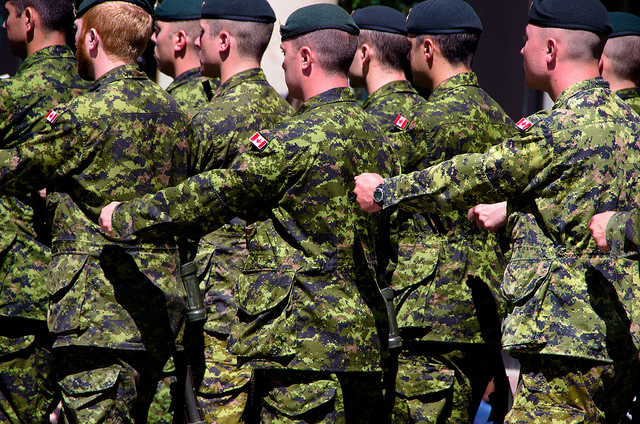Here’s who I would not want to be today: one of the members of the Canadian military who shared stories of sexual abuse with former Supreme Court Justice Marie Deschamps.
According to Deschamps, those who came forward described how military higher-ups deal with sexual harassment and abuse.
They brush it aside and try to make it go away.
Complaining about abuse, Deschamps said, often means suffering re-victimization.
The Chief of the Defence Staff (CDS), General Tom Lawson, tried to make it seem as though he accepted all 10 of Deschamps recommendations, although he carefully affixed an “in principle” to eight of them.
On Wednesday, the CBC revealed a damaging leaked document in which Lawson gave orders, prior to Deschamps’ report being made public, that the military should ignore the former justice’s key recommendation of an independent “centre” to deal with sexual abuse and harassment.
That leak severely damaged both the military brass’ and the government’s credibility.
It confirmed the comments a number of observers made when Deschamps released her report. The senior military command, they argued, will never accept any entity with real power beyond their control.
From the Conservatives’ answers in the House, it seemed clear the government was all too happy to fully support Lawson.
Government MPs kept repeating the bit about accepting all 10 recommendations — “in principle.”
The leak to CBC, which showed that the fix had been in all along, put the cat among the pigeons.
A long and tortured explanation from Lawson
When Opposition Leader Tom Mulcair asked Prime Minister Stephen Harper about Lawson’s leaked orders, Harper was dismissive and tried to make it seem as though Mulcair was quoting an outdated, two-week old “letter.”
Lawson took the leak more seriously.
He put out a long and tortured news release, in which he said he was “disappointed to see the recent media reports on the actions we are taking to respond to the issue of inappropriate sexual behaviour in the Canadian Armed Forces.”
The CDS then tried to say that the CBC’s leaked document merely constituted “planning assumptions” for Major-General Chris Whitecross, who has been tasked with crafting the military’s response to the Deschamps report.
“These planning assumptions,” Lawson wrote, “should in no way be viewed as… orders for her to ignore the recommendations of the final report” — although that is exactly what they said.
“The salient point,” Lawson argued, in a classic example of Orwellian, black-is-white, bureaucratic reasoning, “is not what considerations went into the stand-up of our response team” — that is, what the military brass planned to do before Deschamps publicly issued her report — “rather it is the Action Plan that they developed to respond to this issue.”
Got it?
Lawson addressed the key recommendation for an independent centre outside the military by referring to the fact that Deschamps had suggested examining how other countries, such as France, Australia and the United States, do this.
“We have accepted this recommendation in principle,” the CDS said, and added that “Major-General Whitecross is now actively examining these models to develop recommendations for what will be the best fit in Canada.”
And so, now the reason for accepting Deschamps’ key recommendation “in principle” only is that “we are ultimately uncertain which model will be the best fit for Canada, and therefore how we will implement this recommendation…”
There you have it.
Ignore the black and white words of the document CBC made public, Lawson advises. My words of two weeks ago (now that I have been outed), he now says, do not have the simple meaning they appear to.
The military, the CDS says, merely has to figure out “how” to make this recommendation a reality.
Given the contradictory and confused nature of the military and government’s response, one wonders what would have happened had nobody leaked those two-week-old orders.
When the NDP’s Defence Critic Jack Harris asked Defence Minister Jason Kenney to answer yes or no as to whether the government would entirely accept Deschamps’ recommendation of an independent centre, Kenney answered with one word: “yes.”
That may not be enough to make those who came forward to Deschamps feel safe and respected.
Hands up, in light of Deschamps’ report and the military and political response to it, who would recommend the military to a smart and capable young woman seeking an interesting career?
Photo: flickr/Kurt Bauschardt




